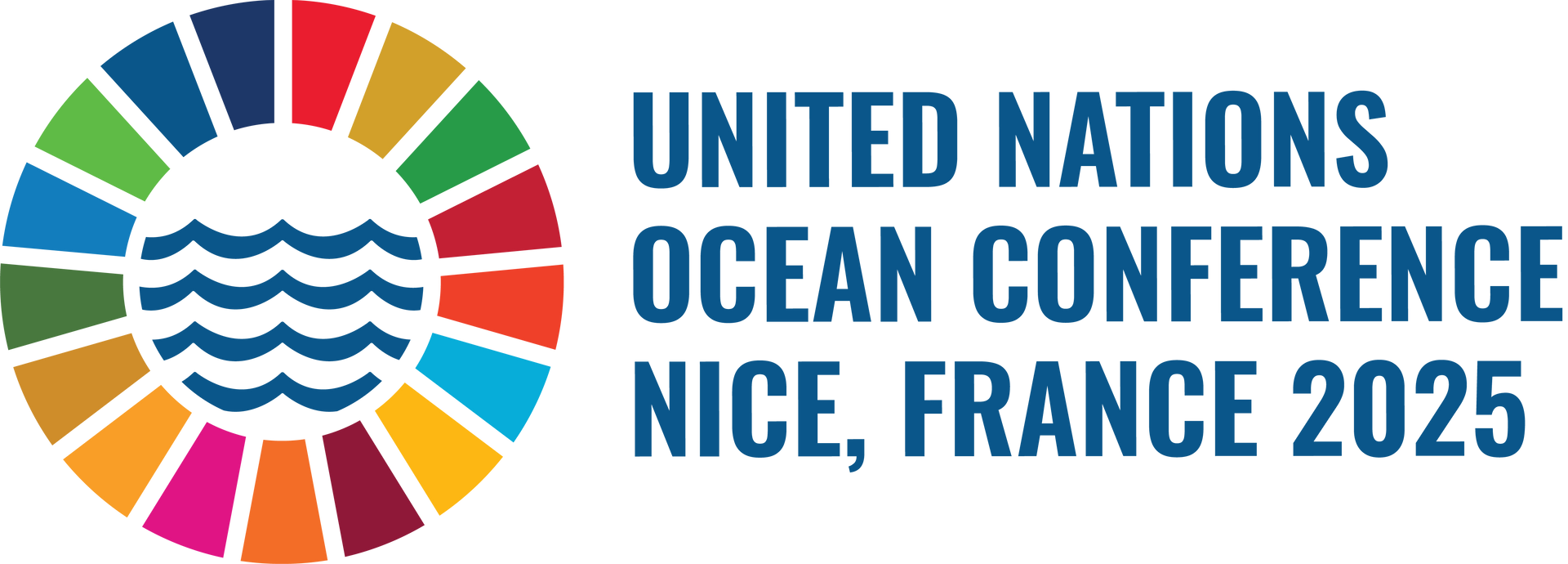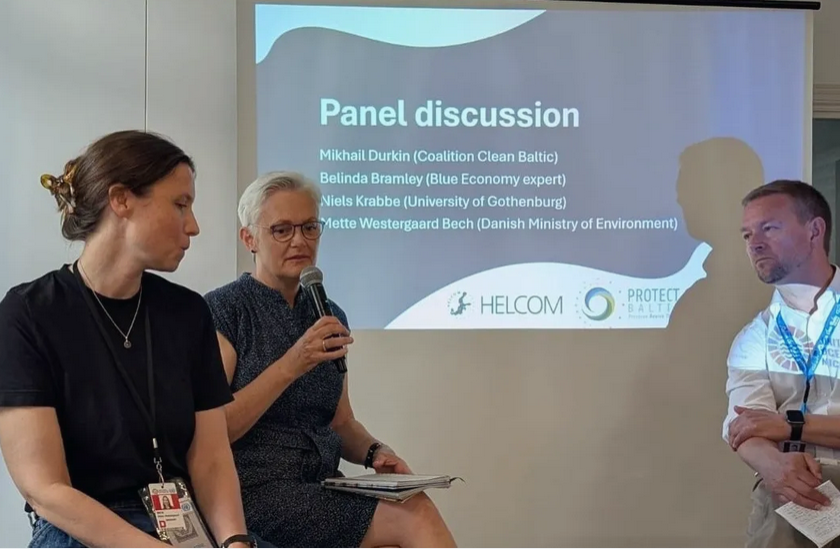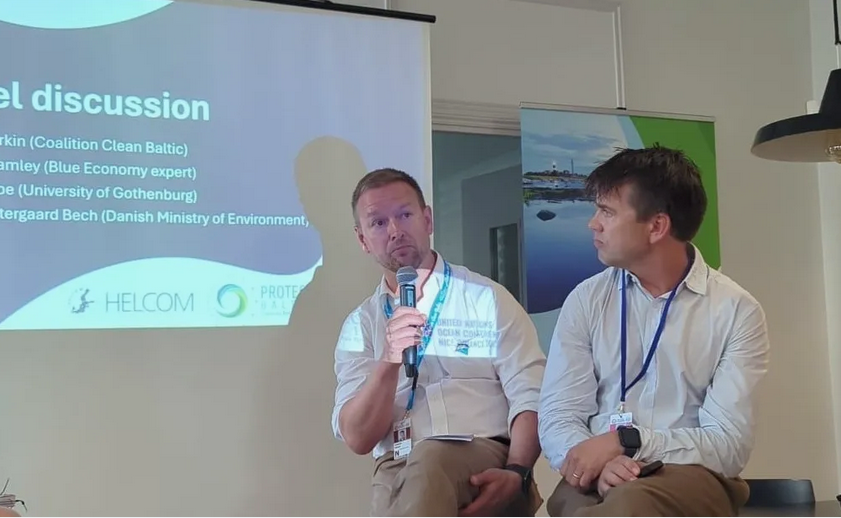External workshop
UN Ocean Conference - Protect Baltic (HELCOM): "The sea knows no borders: transboundary protection for a thriving Baltic"
11 June 2025
External workshop
UN Ocean Conference - Protect Baltic (HELCOM): "The sea knows no borders: transboundary protection for a thriving Baltic"
Start date: 11 June 2025
End date: 11 June 2025
Time: 09:15-11:00 (CEST)
Place: Nice, France
Address: Location: Le Cabo Coworking, 6 Rue du Congrès, 06200 Nice, France
PROTECT BALTIC (HELCOM)
is dedicated to achieving biodiversity goals in the Baltic Sea region. The project collaborates across disciplines, considering species, habitats, and human activities, to support marine conservation and optimize the marine protected area (MPA) network. Protect Baltic is funded under Horizon Europe by the EU under Grant agreement 101112866.
Description
The Protect Baltic (HELCOM) side event "The sea knows no borders: transboundary protection for a thriving Baltic" took place in Nice, France, on 11 June 2025, under the UN Ocean Conference 2025.

The marine ecosystem faces complex challenges that transcend political borders, requiring a collaborative approach, at an ecologically relevant scale, for its protection and restoration. This side event showcased how Baltic Sea nations have come together to transform their commitment to accelerating marine protection efforts into concrete action.
By joining forces to develop a truly transboundary, data-driven, ecosystem based, and holistic approach - addressing every aspect of the protection process. The region is taking the initiative to ensure that not only can the 30% spatial protection target be achieved but that it can be done in a strategic way that optimizes the potential of both existing and new areas, and one that strengthens cooperation and ensures lasting impact.
Aligning with the UN Ocean Decade’s theme of Accelerating Action and Mobilizing All Actors to Conserve and Sustainably Use the Ocean, the event looked at the why, what, and how behind developing a joint regional protection optimization framework. It highlighted that regional cooperation, a commitment to looking beyond targets, and a determination to drive transformative change can foster stronger, more effective marine spatial protection efforts in one of the world’s most impacted seas.
Representatives from key institutions, policymakers, civil society and conservation practitioners were invited to share their views on the initiative and their experiences in, and expectations of, this unparalleled endeavor to enhance marine biodiversity protection on a sea-basin scale.
CCB´s participation
- Mikhail Durkin, CCB Executive Secretary
Outcomes
News article from Protect Baltic (HELCOM) available on the right column.
Agenda
Time Programme
09:45 Welcome and Interactive audience engagement, Katja Laingui (moderator), Admin and Financial Coordinator for PROTECT BALTIC (HELCOM)
09:56 Introduction, Rüdiger Strempel, Executive Secretary, HELCOM
10:03 What is the Baltic Sea?, Cecilia Nyman, Project Coordinator for PROTECT BALTIC (HELCOM)
10:18 Where did this all start?, Jannica Haldin, Special Advisor and Project Manager of PROTECT BALTIC (HELCOM)
10:23 MPA dream scenario revisited, Katja Laingui (moderator)
10:28 Panel discussion
- Mikhail Durkin (Coalition Clean Baltic)
- Kaupo Läänerand (Ministry of Climate, Estonia)
- Niels Krabbe (University of Gothenburg, Sweden)
- Belinda Bramley (Blue Economy Consultant)
10:58 Closing remarks, Katja Laingui (moderator)
Photos
Credit: Protect Baltic (HELCOM)


CCB´s participation is co-funded by

Co-funded by the European Union. Views and opinions expressed are however those of the author(s) only and do not necessarily reflect those of the European Union or CINEA. Neither the European Union nor CINEA can be held responsible for them.

The marine ecosystem faces complex challenges that transcend political borders, requiring a collaborative approach, at an ecologically relevant scale, for its protection and restoration. This side event showcased how Baltic Sea nations have come together to transform their commitment to accelerating marine protection efforts into concrete action.
By joining forces to develop a truly transboundary, data-driven, ecosystem based, and holistic approach - addressing every aspect of the protection process. The region is taking the initiative to ensure that not only can the 30% spatial protection target be achieved but that it can be done in a strategic way that optimizes the potential of both existing and new areas, and one that strengthens cooperation and ensures lasting impact.
Aligning with the UN Ocean Decade’s theme of Accelerating Action and Mobilizing All Actors to Conserve and Sustainably Use the Ocean, the event looked at the why, what, and how behind developing a joint regional protection optimization framework. It highlighted that regional cooperation, a commitment to looking beyond targets, and a determination to drive transformative change can foster stronger, more effective marine spatial protection efforts in one of the world’s most impacted seas.
Representatives from key institutions, policymakers, civil society and conservation practitioners were invited to share their views on the initiative and their experiences in, and expectations of, this unparalleled endeavor to enhance marine biodiversity protection on a sea-basin scale.
CCB´s participation
- Mikhail Durkin, CCB Executive Secretary
Outcomes
News article from Protect Baltic (HELCOM) available on the right column.
Agenda
Time Programme
09:45 Welcome and Interactive audience engagement, Katja Laingui (moderator), Admin and Financial Coordinator for PROTECT BALTIC (HELCOM)
09:56 Introduction, Rüdiger Strempel, Executive Secretary, HELCOM
10:03 What is the Baltic Sea?, Cecilia Nyman, Project Coordinator for PROTECT BALTIC (HELCOM)
10:18 Where did this all start?, Jannica Haldin, Special Advisor and Project Manager of PROTECT BALTIC (HELCOM)
10:23 MPA dream scenario revisited, Katja Laingui (moderator)
10:28 Panel discussion
- Mikhail Durkin (Coalition Clean Baltic)
- Kaupo Läänerand (Ministry of Climate, Estonia)
- Niels Krabbe (University of Gothenburg, Sweden)
- Belinda Bramley (Blue Economy Consultant)
10:58 Closing remarks, Katja Laingui (moderator)
Photos
Credit: Protect Baltic (HELCOM)


CCB´s participation is co-funded by

Co-funded by the European Union. Views and opinions expressed are however those of the author(s) only and do not necessarily reflect those of the European Union or CINEA. Neither the European Union nor CINEA can be held responsible for them.